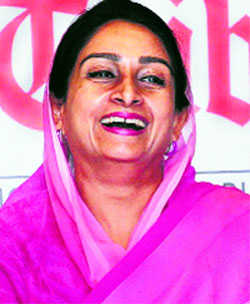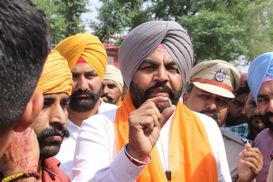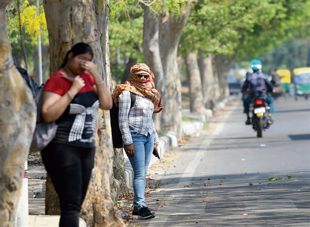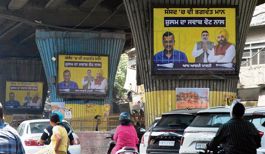
Food Processing Industries Minister Harsimrat Kaur Badal has sanctioned 17 mega food parks in 11 states, including two each in Punjab and Haryana, taking the total number of such projects across the country to 42. She says these new projects will attract an investment of Rs 2,000 crore for infrastructure, additional collective investment of Rs 4,000 crore in 500 food processing units and an annual turnover of Rs 8,000 crore. When fully functional, the parks, the Minister claims, will generate employment for 80,000 persons.
How do these proposed projects aim to achieve the objectives?
The flagship programme of the ministry aims at strengthening infrastructural facilities across the country and providing modern facilities to entrepreneurs who are interested in setting up food processing units in mega food parks. The food processing sector is one of the growth engines out of 25 sectors identified for the “Make in India” initiative launched by Prime Minister Narendra Modi recently. The 17 new projects will help realise the potential of the food processing sector substantially by reducing wastage of perishables as well as agriculture/horticulture crops and also provide suitable remuneration to farmers. They will also help harness the potential of agricultural and horticultural crops in different agri-horti clusters of the country.
How will these parks help?
Each park is expected to benefit 6,000 farmers/producers directly and 25,000-30,000 indirectly. They will directly benefit around one lakh farmers and at least 5 lakh farmers indirectly. Each project will also generate employment for about 3,000 persons directly or indirectly. Thus, they will provide employment to about 51,000 persons directly or indirectly. At the rate of 30 food processing units per park, there will be more than 500 food processing units in these 17 new projects in the next two years or so.
The average Rs 10-15 crore investment per food processing unit comes to Rs 400-500 crore for 30 units in a park. Thus, for 17 new parks, it would be around Rs 8,500 crore. At least two to three such parks are to be set up in each state to take care of the raw material production of agricultural and horticultural crops. The farmers will benefit through better remunerative prices and many will get direct or indirect employment in the next few years.
What is the concept of a food park based on? How will your ministry ensure that it benefits all stakeholders?
A mega food park is located over a minimum of 50 acres and works in a cluster approach based on a hub and spoke model. The hub, being the core processing centre, would work towards secondary and tertiary value addition of agricultural and horticultural crops. The spokes — primary processing centres and collection centres — will provide basic facilities for providing primary value addition at the farm level by catering to the facilities of sorting, grading, packaging, pulping, ripening, chambers and packaging. Consumers will also benefit with quality food products. Thus, the entire supply chain — farmers, processors, retailers and consumers — will draw benefits.
It is a win-win situation for everyone as the entire area benefits. Infrastructure is created for primary processing and storage near the farm in the form of primary processing centres and collection centres located in production areas. Common facilities and enabling infrastructure help in reducing the cost of individual units significantly and makes them more viable. Induction of the latest technology, quality assurance of processed food products and meeting of environmental and safety standards are the other major benefits.
What are your plans for the future, especially in the northern region?
The Central government wants all states to benefit from this unique scheme. I wish more applications are received when the ministry floats its next EoI (expression of interest). As far as J&K, Himachal and Uttarakhand are concerned, the ministry has already sanctioned one project each to these states. The food parks in Udham Singh Nagar (Uttarakhand), Pulwama (J&K) and Una (Himachal) are in different stages of implementation. The Patanjali Food and Herbal Park at Haridwar is already operational. I have given directions for strict and periodic monitoring in terms of milestones.
When will the new projects, including the two each sanctioned for Punjab and Haryana, start functioning?
A time period of 30 months has been given for completion of the newly-sanctioned projects. With strict monitoring and regular milestones, I am sure that the projects sanctioned to Punjab and Haryana will be completed well within time.
What is the status of the 25 food parks already existing in the country?
Four have become operational. Recently, the Prime Minister inaugurated one at Tumkur in Karnataka and I inaugurated the one at Fazilka in Punjab in December. In three to four months, three more parks would become operational — Northeast Mega Food Park in Nalbari (Assam); Jangipur Bengal Mega Food Park in West Bengal; and Indus Mega Food Park in Khargaon (Madhya Pradesh).
The remaining are in advanced stages of implementation and the ministry will ensure that these are completed possibly in the coming financial year.
What’s the update on the Fazilka food park?
They have completed all the core processing facilities like modern warehousing, cold storage, sorting, grading packaging, pulping, ripening chambers and are taking steps to create primary processing centres. I am sure that several entrepreneurs will take advantage of the facilities by setting up their units in the mega food park. They can also avail the concessional rate of interest from the NABARD fund of Rs 2,000 crore.
Apart from state governments, such projects have been allocated to private companies, including Adani Ports & SEZ. There is lot of speculation about these private projects.
The ministry has followed a strict and transparent criteria for the selection. In fact, proposals so received were scrutinised by two or three committees. Therefore, the selection was not only fair and transparent, but also on merit. The ministry received 72 proposals and after a stringent and transparent process of scrutiny, 17 from 11 states were approved.


























